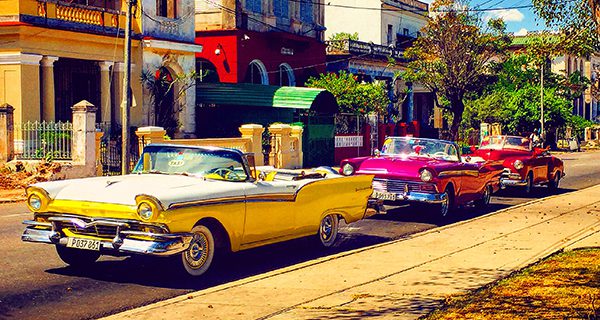[ccfic caption-text format="plaintext"]
By Geena Matuson
Hometown Weekly Staff
Over the last 100 years, the US and Cuba have had a rocky relationship. From the 1898 Spanish-American War ending with Spain ceding its Cuba territory to the US to the political revolts throughout the 1950s to the Cuban Missile Crisis and CIA assassination plots against Fidel Castro in the early 1960s, one might say the term ‘rocky’ is an understatement.
While a partial US embargo was placed on Cuban goods in 1960, the US ceased all relations in 1962. Then, in 1991 with the fall of the Soviet Union, one of Cuba’s allies, many thought the embargo on Cuba would never end. In a shocking twist in 2016, with a partial embargo lifted under US President Barack Obama’s second term in office, citizens of both the US and Cuba are able to travel in and out of the country with relative ease.
In order to travel to Cuba, though, you need a visa - and you can’t just go as a tourist. Recently, two Medfield residents and staff at Medfield TV made the trip south. Sam Merlin, MHS ’15 and Director of Photography/Editor at Medfield TV, and Alexandra James, MHS ’10, Emerson ’15 and Producer/Editor at Medfield TV spent 10 days in Cuba this past May, and shared some incredible insights into the trip, and Cuban culture.
Alex and Sam found the travel group Witness for Peace, a non-profit, grassroots organization sponsoring trips for “people-to-people delegation,” a “travel category [that] provides for educational exchanges when those exchanges promote people-to-people contact. Delegation themes range from arts and culture, education and law to sustainable agriculture and health care.” Alex explained that “you can’t go to Cuba as a ‘tourist’ because we’re trying to facilitate a relationship between the US and Cuba, so there’s no sittin' at the beach with drinks!” Their trip included visits to medical schools and doctors, farms and villages, local artists and more through these “educational exchange activities that will result in meaningful interaction between delegates and Cubans.”
Witness for Peace (witnessforpeace.org) is just one of many people-to-people groups helping delegates travel to Cuba, and the organization handled all visas and travel documents. The two flew to Miami, Florida and from there took a charter plane out to Cuba the next day. There are no additional restrictions as far as packing for the trip right now, and going through customs was not an ordeal. Many people traveling to Cuba were carrying television sets, “because you can’t buy one and ship it into Cuba, you have to physically carry it back,” Alex explained. The airport in Cuba where the two landed was simply an airstrip with a few buildings, nothing big. It took two hours to get luggage off the plane, but “everyone was looking at bags, reading name tags and calling out names to help each other. That’s something you don’t see in the US much…” Sam noted, adding, “that was the Cuban people in general: incredibly welcoming, friendly…no bad blood that we were Americans.”
Once in Cuba, there were no restrictions on their travel, and they could go freely throughout the country. They could also photograph whatever they pleased, and the array of photographs the two gathered is vast. They spent time first in the city of Havana before moving on to the country, an area in Western Cuba in Pinar del Río Province called Viñales. While they were happy to have visited both areas, they both enjoyed the country most. “We saw limestone cliffs that our guide told us are only in three places in the world: Vietnam, parts of China, and Cuba. In Vietnam they overlook the water, but here, the limestone walls overlook large fields of farmland and cows. Really beautiful,” Alex recalled, a faraway look in her eyes. They also hiked into a cave, and Sam “tried to take pictures, but even those can’t capture how beautiful it is; it’s such a disconnect from society - even more than Havana, which still doesn’t have modern amenities like internet.”
Because they are a communist country, “they live with almost nothing - just the bare minimum, but they are so happy; they’re an incredibly tight-knit community and spend time with each other without focusing on material items,” Sam explained, “and it was nice to see that with lesser material items, they still had happiness; it’s not a materialistic society, and it’s different from the US and how we link happiness to material items, like our iPhones and computers.” Alex also noted that, while beautiful, it was sad to see such grand city streets, and antique buildings, in need of repair, “Because there is no import-export, many beautiful buildings are in disrepair without a way to fix them - very different from the romantic paintings and images we see prior to embargo.” This was a humbling trip, and as they hiked through farmland and villages, they said it was hard to process the reality of Cuban day-to-day life. The hotels have internet and hot spots, and on weekends people crowd around the area with their phones and computers to check email for the week. There weren’t even many cash registers, mostly calculators, and the two didn’t see any computers or TVs during their 10-day stay. “I later heard the Kardashians were in Cuba the same time we were, and because they don’t have cable in Cuba, no one had any idea who they were!” Alex said.
With few television sets, computers and little-to-no internet, Cubans turn to literature. In the marketplace, you can find book stands, along with libraries, and newspapers circulating throughout. When Fidel Castro had come into power some 50 years ago, one of his initiatives was literacy. And, it seems, it’s working - Cuba has a 99.8% literacy rate as of 2016, and mandatory school education, as compared to the US with a literacy rate of roughly 85%, with 21% of all adults reading below a 5th grade level. However, UNESCO has not reported US literacy rates in the last two years.
Cuba even has a lung cancer treatment, CimaVax, that targets the cancer tumor with insignificant side-effects. Amazing still, this treatment only costs Cuba’s government $1 per shot. This vaccine will soon be making its way to the US, and it may be a step towards overturning Cuba’s debt.
Some of the people they spoke with included a family Doctor, and all of her records are done by hand. One man said that when he was a child, he saw the most beautiful colored pencils he’d ever seen - and then the embargo happened, and he never saw them again. Just this year, he had a friend bring him those colored pencils from the US. However, Cuba has a growing and thriving art scene, home to now-legal, private galleries and The Havana Biennial. Humorously, “Cuba is the only country on earth where the richest people are the artists…a mid-career artist makes an average of 100 times what a neurosurgeon makes in a year. And why is that? Because Cuban law allows artists to sell their works to foreign collectors and dealers in exchange for hard currency.”
Many Cubans had said they were grateful that Americans were there, “because it is so important to have a relationship with a neighboring country, and our positive relationship will benefit the Cuban people when the trade routs re-open,” Alex explained. The two also ventured to a farm and visited an older man who had been diagnosed with cancer. He was so grateful for the visit, he wrote a letter to the group in which he said he had cried, and was inspired to find the will to live.
The people they visited throughout cities, farmland and villages, expressed their joy and a degree of gratitude towards our travelers’ interest in their culture, and the desire to be friends and establish a relationship. “Everywhere we went, we asked ‘how did the embargo impact you?’ because we want to be able to come back to the US and advocate for the positive aspects of the end of the embargo,” Alex said. Sam added that they “had a meeting with the organization at the end of the trip, and they asked how we’d advocate for Cuba, and it’s encouraged to contact state representatives.” While Obama lifted certain aspects of the embargo on Cuba, Congress has the final say in lifting the embargo altogether.
And, as it turns out, the tour group was in Cuba over Mother’s Day weekend, and the whole country celebrates. “We went into a Museum the Friday before [Mother’s Day], and when we got there the director ran in and said she was so sorry the staff were off for Mother’s Day and couldn’t show us around! They got the Friday before Mother’s Day off from work,” Alex said in awe. Women seem to be revered, and it appears as though there is less of a gender gap, with both genders given equal opportunity. Sam noted, “I think there’s a misconception about [Cuba as this] oppressive government, which often comes with silencing women and minorities - but even our tour guide said she always felt free to speak her mind. There are still issues, but it doesn’t seem to be as bad as in the US.”
Both Sam and Alex said they would love to return to Cuba, and that everyone should go to see the beautiful sights and experience the culture. You can hear more about Sam and Alex’s trip to Cuba as part of a Medfield TV special ‘Citizen Spotlight’ with Richard DeSorgher, soon to be airing on your local cable stations.


























